Engender blog
Guest Post: Gen Z, the promise of progress, and the persistence of patriarchy
Against the backdrop of the rise in online misogyny and far-right politics, young women are increasingly concerned about a regression in their human rights. In this guest blog, MSc student Matilda Fairgrieve interrogates Gen Z’s socially active image and shares her perspective as part of a digitally divided generation.
-700.png)
Folk are fascinated by Generation Z and our many nuances.
Media outlets fiercely debate our stereotypes; from digital addicts to digital activists, the generation to which I belong is a subject of collective curiosity.
Public commentary often considers our social conscientiousness, ‘changing the workplace and culture as we know it.’ We are viewed as radical, curious and progressive; seldom are we interrogated further. But are we really this way?
Here, I explore this perception of my generation and alert attention to where assumptions of progressive attitudes demand questions – gender equality.
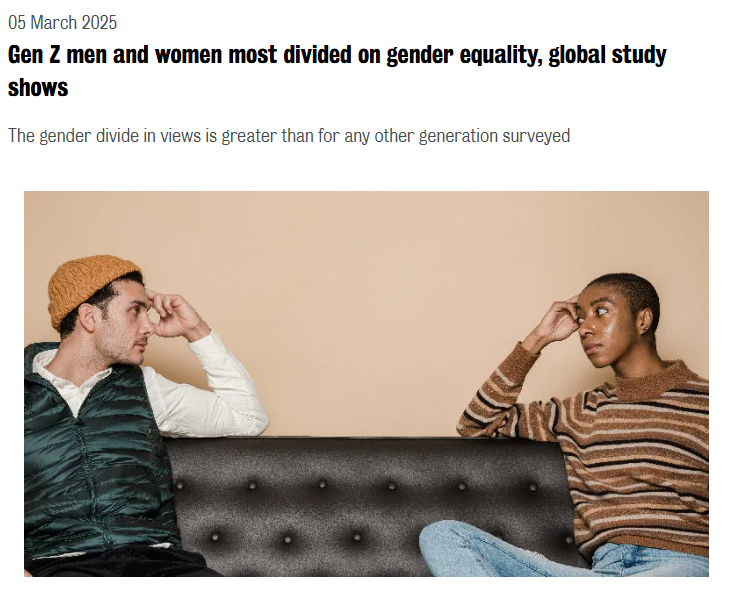 57% of Gen Z men believe women’s equality has gone so far that it discriminates against men. This finding is not in isolation; with another 32% of young men believing gender equality has negatively impacted men. In this context, I position myself among the 59% of my generation who believe there is tension between men and women.
57% of Gen Z men believe women’s equality has gone so far that it discriminates against men. This finding is not in isolation; with another 32% of young men believing gender equality has negatively impacted men. In this context, I position myself among the 59% of my generation who believe there is tension between men and women.
Countless research studies and media outlets will tell you of this “tension” between Gen Z men and women. But how does this tension translate? Trepidation, as Gen Z women ponder these statistics, perplexed. How can it be that such a staggering proportion of young men we share space, workplaces and relationships with hold these views? Despite our disbelief in the percentages, there is no doubt about the problems and pain we’ve experienced as a result. A society entrenched in unequal power, from underrepresentation in politics and leadership, persistent gender pay and pension gaps, disproportionate burden of care as the norm and the violence against women and girls (VAWG) epidemic.
Intergenerationally, there is some difference in how men and women identify as feminists. However, Generation Z’s Millennial, Gen X, and Baby Boomer counterparts are not nearly as divided on the overarching importance of gender equality. Could Gen Z simply grow out of this divide? Debatable when contemplating the socio-cultural realm Gen Z grew into.
Gen Z: The distinct divide
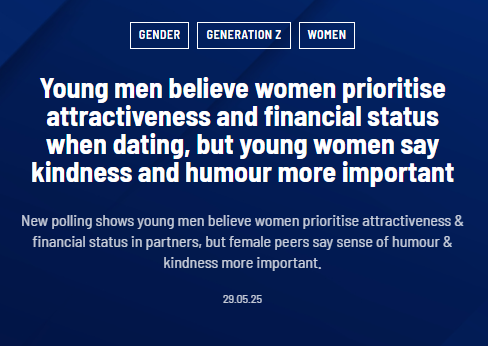 Unique to Gen Z’s divide is the danger lurking in the digital. It is no coincidence that a generation of men aged in a media-fuelled weaponisation of masculinity are threatened by gender equality. Research correlates the self-assessed importance of masculine identity with lower support for gender-equitable policy. Disconcerting political support compounds disconcerting narratives held by young men. Misogynistic and even incel ideologies have crept into dominance, such as 53% of young men believing women are only attracted to a “certain subset of men.”
Unique to Gen Z’s divide is the danger lurking in the digital. It is no coincidence that a generation of men aged in a media-fuelled weaponisation of masculinity are threatened by gender equality. Research correlates the self-assessed importance of masculine identity with lower support for gender-equitable policy. Disconcerting political support compounds disconcerting narratives held by young men. Misogynistic and even incel ideologies have crept into dominance, such as 53% of young men believing women are only attracted to a “certain subset of men.”
As manipulative media actors exploit tensions, isolation among young people is accelerating. 19% of young adults reported having no one they can count on socially. The most digitally connected generation exists in a remarkably distrusting, detached state.
While digitally destructive shifts did not shape the playgrounds of Gen Z’s infancy, I’d argue that a physical shift in our playgrounds set a precedent for disconnect. Gen Z’s early 2000s upbringing coincided with the introduction of Multi-Use Games Areas (MUGAs) in public parks. Open outdoor spaces, a place for equal play, became unprotected from gender roles and division, with boys making up 90% of MUGA usage.
My friends and I shared a similar sentiment to that uncovered in research: “there is nothing stopping us going through the gates of MUGAs, but we don’t feel we should.” From divided children to digital teens – the trajectory of gendered socialisation for Gen Z was fundamentally different.
Reflecting on our unique transition into the digital age with little protection, Gen Z women and I question what this means for present gender equality. With real-world implications of misogynistic digital narratives in corporate and political fields already evident, the time to ask is now.
Building bridges to connect: Real-world gender equity
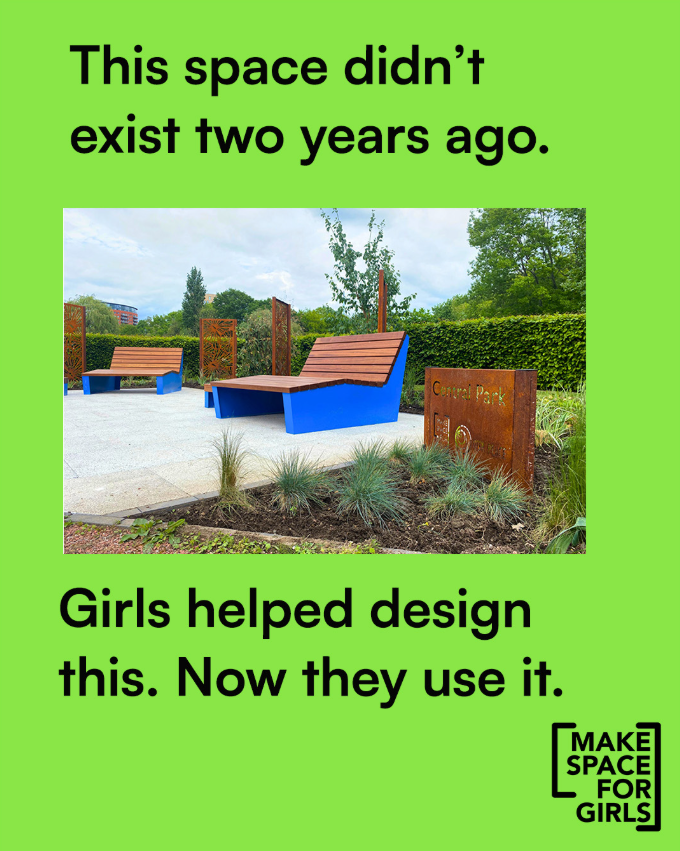 If Gen Z’s polarisation is a partial result of our upbringing, there is hope for progress in remedying social disconnection and in intervening with the voices that use it as a weapon. Without minimising the complexity we face, the courage to connect and build a bridge rather than a wall certainly feels like a place to begin.
If Gen Z’s polarisation is a partial result of our upbringing, there is hope for progress in remedying social disconnection and in intervening with the voices that use it as a weapon. Without minimising the complexity we face, the courage to connect and build a bridge rather than a wall certainly feels like a place to begin.
Of course, bridges must be built from primary prevention. While the ideological divide of Gen Z men and women may have been digitally fuelled, it was made possible by the root cause of gender inequality. The grip of misogynistic media would not be so tight in a gender-equal, real world.
It is promising to see primary and secondary prevention work picking up much-demanded acceleration in Scotland through initiatives such as the Equally Safe at School and Equally Safe at Work programmes, both shaped by a gendered understanding of the root cause of VAWG. Inspiring work to rectify early disconnects is on the rise, too, with the Make Space for Girls campaign ensuring gender mainstreaming in public spaces for play.
However, the current division between Gen Z men and women requires additional tertiary prevention, acknowledging that these attitudes are already abundant.
To my fellow Gen Z men and women, I’d like to meet outside of the digital world. In-person dialogue, focused on listening to lived experiences and restorative approaches to harm, moving from individual fear to collective security.
Do so with enough meaningful intent, and I’d like to believe our perceived progressive nature will not require interrogation. Building a bridge, together, that serves not only to connect once again, but provide an exit pathway from polarisation and a route to a gender-equitable future.
This guest blog was submitted by Matilda Fairgrieve (she/her), a Gen Z intersectional feminist and MSc student in Political Communications and Public Affairs, inspired by the drive to grow into a gender-equitable future in Scotland.
Guest posts do not necessarily reflect the views of Engender, and all language used is the author’s own. Bloggers may have received some editorial support from Engender, and may have received a fee from our commissioning pot. We aim for our blog to reflect a range of feminist viewpoints, and offer a commissioning pot to ensure that women do not have to offer their time or words for free.
Interested in writing for the Engender blog? Find out more here.
Guest Blog: Gender and precarity in the 21st century workplace – universities and beyond
Even before the pandemic, women’s employment was increasingly precarious. Work from our sisters at Close the Gap shows that women are more likely to be in insecure work, on zero hours or temporary contracts, and are two-thirds of workers earning less than the real living wage. Black and minoritised women are overrepresented in precarious work, and are more likely to be on zero hours contracts.
Today on our blog, researchers Dr Lena Wånggren and Dr Cécile Ménard share their work on the gendered impact of job insecurity and precarity, and why we need to make women’s unpaid, unrecognised work visible. Illustrations throughout are by Maria Stoian.
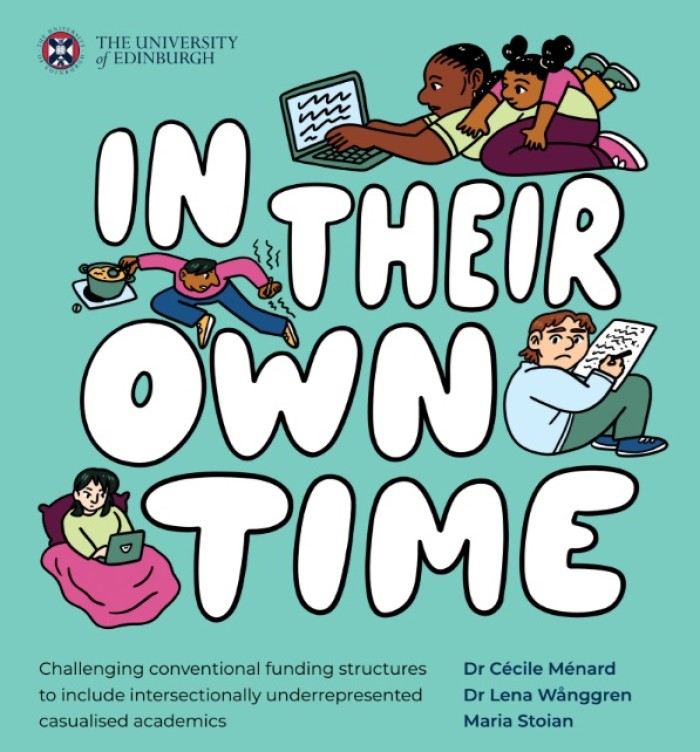
Casualisation – the precarisation of work, in which core business previously done by colleagues in permanent jobs is done on an hourly, fixed-term, sessional, and one-off basis – is a key feature of the 21st-century workplace.
This blog post, written by two long-term insecurely employed feminist researchers at a Scottish university, shares research on job insecurity and inequalities in the UK workplace. Making visible women’s unpaid and invisibilised work and the intersectionally gendered impacts of job insecurity, we highlight what needs to change.
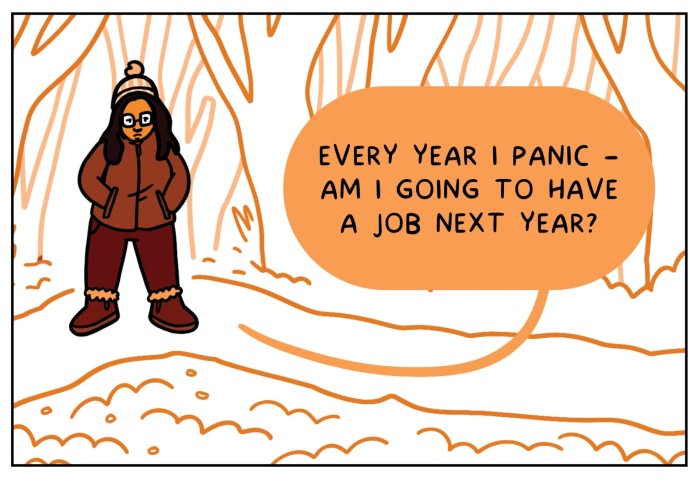
The gendered impact of job security
Job insecurity has become the norm in UK workplaces, especially since the 2008 financial crisis and the austerity measures that followed, when anti-feminist cuts to social infrastructure went hand in hand with anti-worker legislation and policies across sectors. UK Universities, once seen as a prestigious place of privilege, are one of the most casualised (that is to say, reliant on insecure contracts) sectors in the UK: around half of academic staff are employed on insecure contracts, and higher education is the second most casualised sector in the UK after hospitality.
Precarity is not experienced equally. Migrants and racially minoritised persons are more likely to be employed on insecure contracts and, in fact, more likely to be in severely insecure work. While trade unions, feminist researchers and campaign groups have highlighted the detrimental and intersectionally gendered impact of job insecurity, including the exacerbated risk of sexual and racial violence, there is a lack of action among employers and governments to tackle the problem. To address the equalities impact of contractual precarity, we need an intersectional feminist perspective with a focus on workplace justice.
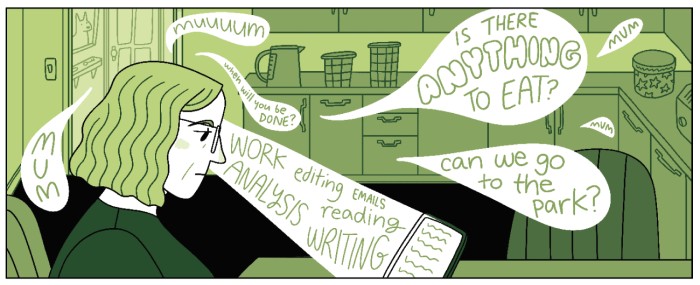
Job security is a workplace issue and a gender equality issue
There are two ways in which we approach gender and precarity in the workplace: from an intersectional feminist framing and from the issue of workplace justice. In the context of our 21st-century precarisation of work across sectors, with gig economy and platform models spreading, and the gendered and intersectional impacts of such an economy, specific problems need tackling. One specific and urgent issue is the financial instability of women in precarious work, with dependency on a partner related to risks of gender-based violence, especially for groups of migrant women who have no recourse to public funds. Family planning is affected when a stable job or living situation is not on the horizon. Job security is both a workplace issue and a gender equality issue.
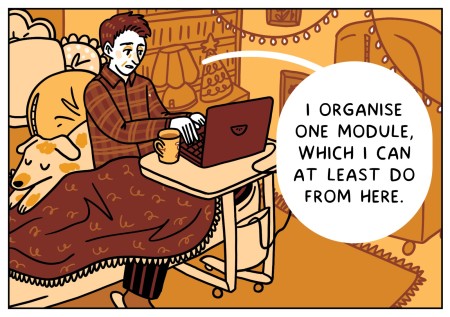 The university sector – still seen by many as a prestigious place of privilege – reproduces the same structural inequalities as the broader society. More than 40% of teaching staff are on hourly or zero-hour contracts that often do not pay enough to live on, with some relying on food banks to get by. While hourly workers are underpaid for the amount of work they are contracted to do, and the work is insecure, researchers are usually on fixed-term contracts, and are encouraged to apply for prestigious awards and grants for their careers in their own time. If they are successful, there is no guarantee of job security; the prestige and cashflow benefit the institution while the worker remains expendable.
The university sector – still seen by many as a prestigious place of privilege – reproduces the same structural inequalities as the broader society. More than 40% of teaching staff are on hourly or zero-hour contracts that often do not pay enough to live on, with some relying on food banks to get by. While hourly workers are underpaid for the amount of work they are contracted to do, and the work is insecure, researchers are usually on fixed-term contracts, and are encouraged to apply for prestigious awards and grants for their careers in their own time. If they are successful, there is no guarantee of job security; the prestige and cashflow benefit the institution while the worker remains expendable.
Women’s unpaid work in universities and beyond
In our current research project, In Their Own Time, we have partnered with our trade union, UCU, to examine a key problem in struggles for gender equality: the undervaluing of women’s work. Unpaid labour has long been at the heart of the feminist struggle. From the Wages for Housework campaign to the work of scholars such as Selma James, Dorothy Smith and Patricia Hill Collins, feminists have shown that defining ‘work’ only as paid labour renders invisible the gendered, racialised labour that keeps institutions—and societies—going. While reproductive work, such as care work, is gendered and racialised, women’s work across society is also underpaid, undervalued, and invisibilised, with the labour market maintaining sexist, racist and ableist structures. This gendered undervaluing of work shows through in expectations of unpaid work and lack of support structures in the academic workplace.
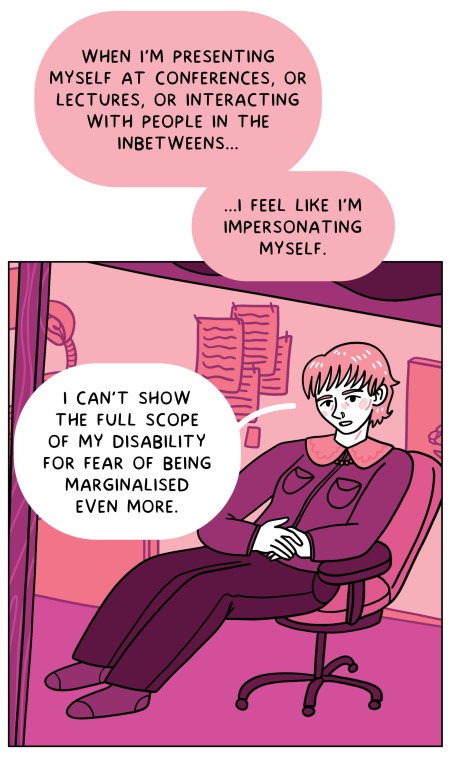 Working with the fantastic feminist illustrator Maria Stoian, the participants in the project tell stories of combining paid and unpaid work, visa applications, health issues, and a range of insecure jobs. Steph, a single mum who juggles housework, childcare, and two insecure jobs, states: ‘Every year I panic – am I going to have a job this year?’ What she calls her ‘own time’ is at night when she does emails for her jobs after her child has gone to bed. Susie, a casualised researcher for 20 years, remarks on the expectation of working unpaid in academia, for example, applying for funding in her own time even when not paid for it: non-academic colleagues think ‘it’s crazy’, but in academia, it’s normalised. She highlights that not everyone can work for free – with childcare responsibilities, she needs flexibility. Alex is a disabled academic whose disability has been made worse by precarity. Another participant, Eimhir, explains that she spends managing her chronic health condition alongside paid work and cannot fit in further unpaid academic work even if this is required to succeed in the university. Olivia, a mum and researcher, keeps her work with her all the time – including marking dissertations by the pool when the kids are at swimming lessons on Saturday morning. Meanwhile, Gwen is a trans academic in precarious part-time jobs: she gives lectures, does research, organises events, and supports her colleagues, all unpaid in her spare time.
Working with the fantastic feminist illustrator Maria Stoian, the participants in the project tell stories of combining paid and unpaid work, visa applications, health issues, and a range of insecure jobs. Steph, a single mum who juggles housework, childcare, and two insecure jobs, states: ‘Every year I panic – am I going to have a job this year?’ What she calls her ‘own time’ is at night when she does emails for her jobs after her child has gone to bed. Susie, a casualised researcher for 20 years, remarks on the expectation of working unpaid in academia, for example, applying for funding in her own time even when not paid for it: non-academic colleagues think ‘it’s crazy’, but in academia, it’s normalised. She highlights that not everyone can work for free – with childcare responsibilities, she needs flexibility. Alex is a disabled academic whose disability has been made worse by precarity. Another participant, Eimhir, explains that she spends managing her chronic health condition alongside paid work and cannot fit in further unpaid academic work even if this is required to succeed in the university. Olivia, a mum and researcher, keeps her work with her all the time – including marking dissertations by the pool when the kids are at swimming lessons on Saturday morning. Meanwhile, Gwen is a trans academic in precarious part-time jobs: she gives lectures, does research, organises events, and supports her colleagues, all unpaid in her spare time.
As seen in our project, the reliance on intersectionally gendered unpaid labour creates further inequalities because it excludes those whose own time is other people’s time – such as those with caring responsibilities, the majority of whom remain women – or those whose own time is recovery time, as is the case for many disabled individuals.
Job security now!
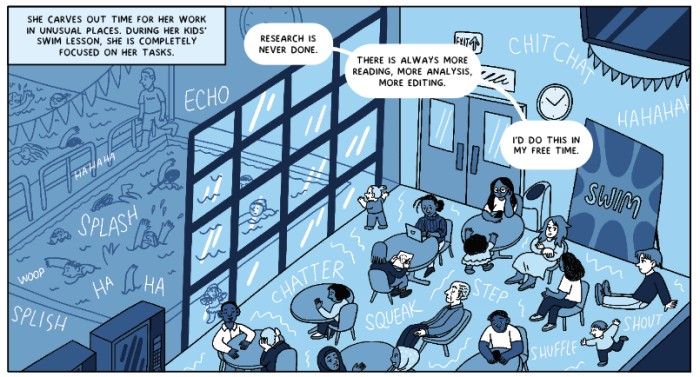
Precarity is everywhere: environmental, geopolitical, and at work. We can make distinct policy changes to address this: we need decent, secure jobs for women and for all - that is key to gender equality. Together with trade unions, workers’ organisations, and feminist organisations, we call for immediate institutional and governmental action on job insecurity, intersectional gender inequality, and an end to the invisibilisation of women’s work. Addressing job insecurity requires more than reforming individual contracts—it demands dismantling the structures that normalise insecure, unpaid labour as inevitable. Such action extends far beyond universities. Across sectors, a renewed feminist politics of labour is urgently needed—one that centres care, builds intersectional solidarity and challenges the exploitation of those whose time has always been devalued.
This project was supported by the UKRI and the British Academy Funding through the Equality, Diversity and Inclusion Caucus (ES/X008444/1)
Recommended viewing: Our Time Is Coming Now (BBC, Selma James & Michael Rabiger, 1970)
Guest posts do not necessarily reflect the views of Engender, and all language used is the author’s own. Bloggers may have received some editorial support from Engender, and may have received a fee from our commissioning pot. We aim for our blog to reflect a range of feminist viewpoints, and offer a commissioning pot to ensure that women do not have to offer their time or words for free.
Interested in writing for the Engender blog? Find out more here.
General Election 2024 - The Rwanda Scheme & Safety of Women – Joint Blog with Amina MWRC
[Content Note: abuse, sexual assault]
In this joint blog, women’s rights experts from Amina MWRC and Engender come together to discuss the safety of women in light of the Rwanda Act.
We are calling on candidates in the upcoming General Election to commit to taking action on four key areas for women if elected. In our What’s in it for women? four-part series, we’ll break down each of our key asks covering health, social security, equal representation and immigration.
Find and email your local candidates with our pre-written letter here.
.png)
Women, Scotland & Inclusion: We need more than 'inspiring' inclusion
This International Women's Day, we're overjoyed to share with you four guest blogs from women across Scotland who are making meaningful steps towards women's equality. The theme of IWD this year is #InspireInclusion, & we asked our bloggers to talk about the communities and campaigns happening across the country.
-600.png)
Nosheen Ahmed is the Employability Project Coordinator at AMINA, the Muslim Women's Resource Centre. She is a trained Independent Domestic Abuse Advocate (IDAA).
 I came across this meme that has been circulating on LinkedIn inspired by the Beckhams, and it made me laugh because it hit the nail on the head…nothing says inclusion like a cupcake, right?
I came across this meme that has been circulating on LinkedIn inspired by the Beckhams, and it made me laugh because it hit the nail on the head…nothing says inclusion like a cupcake, right?
Thank you for the tokenistic gesture, but what we really want to see is meaningful change where as women, we can thrive in an environment that brings out the best in us.
Equality, Diversity, Inclusion, the 'buzz words' organisations across sectors have been using, but how are these words actually being implemented in reality to tackle all the 'isms' that exist in today's society?
Featuring your only BME or disabled person on your website, social media or marketing materials doesn't quite inspire inclusion, especially when the board of directors have a disproportionate ratio of men, women, and people of colour on it. We can see through the façade and know when we are the diversity hire or tick box exercise to increase the EDI stats. Please don't use us to promote you are 'an inclusive employer' when your policies and internal practices are to the contrary.
For the majority of my career, I have been either the only BME person within my organisation or from the minority. I was never able to bring my entire self to work, or proudly share my identity of being a Scottish, Pakistani, Muslim woman. When I first started my career journey, I wanted to fit in and focus on the job I was employed to do. Therefore, microaggressions, racist, sexist or Islamophobic comments were tolerated with a fake smile as I didn't know how to challenge them in fear of losing my job.
However, over the years, I observed the covert and overt forms of discrimination, sexism and racism that occurred in the workplaces which affected me and others from marginalised communities. My lived experience has now become my expertise and valued by organisations that are serious about making their workplace more inclusive.
When I speak to organisations who say they want to increase their diversity, some of the first things they tend to say is:
- We don’t know how to reach the marginalised communities.
- We don’t get many applications from BME people when jobs are advertised.
- Women aren’t applying for senior management roles.
The onus is automatically put on the marginalised community being hard to reach when they aren't. Perhaps there are barriers preventing them from applying and pursing those career opportunities. As an organisation that is serious about inclusion, you have to actively look for and engage with the communities you want to reach and work with them to remove these barriers.
If you don't know where to start, reach out to a specialist BME organisation such as AMINA The Muslim Women's Resource Centre that has been around for the last 25 years serving women from the Muslim and BME communities. Managing the employability project at AMINA, my team and I are always open to partnership working and can help promote vacancies, skills development, volunteering opportunities, and facilitate focus groups.
Celebrating Inclusion
Of all the places that I have worked, AMINA is the only place I feel I can bring my true, authentic self to work. Why? Because I don't have to explain my faith, my culture, or my feminine issues, I am accepted for who I am; there is a sense of belonging, a shared understanding, and a real family feel. This is what true inclusion should feel like for everyone.
At AMINA, it's International Women's Day, every day! We are fighting for women's equality in all areas of life and celebrate the unrecognised invisible work they do outwith their day job by ensuring our internal policies help them achieve a work-life balance.
In 2024, we should all be doing better at inspiring inclusion. It's a collective and collaborative effort that requires buy-in from everyone within an organisation. It's not a gender problem, a BME problem, or a race problem… it's a societal problem that we all need to work on together. After all, we can all enjoy a cupcake (or two) while being different together without needing a dedicated day to celebrate.
Guest posts do not necessarily reflect the views of Engender, and all language used is the author's own. Bloggers may have received some editorial support from Engender, and may have received a fee from our commissioning pot. We aim for our blog to reflect a range of feminist viewpoints, and offer a commissioning pot to ensure that women do not have to offer their time or words for free.
Interested in writing for the Engender blog? Find out more here.
Women, Scotland & Inclusion: What's next for Scotland's feminist future?
This International Women's Day, we're overjoyed to share with you four guest blogs from women across Scotland who are making meaningful steps towards women's equality. The theme of IWD this year is #InspireInclusion, & we asked our bloggers to talk about the communities and campaigns happening across the country.

Amanda Amaeshi is an activist and campaigner. She is a Young Spokesperson for Girlguiding Scotland and sits on the First Minister's National Advisory Council on Women and Girls. She is currently studying law at UCL and has been named within the young Women's Movement 30 Under 30 list, the WOW Foundation's Young Leaders Directory and Glasgow Times Young Scotswoman of the Year.
In November 2023, Engender held its Annual General Meeting, in celebration of the charity's 30th anniversary.
The event served as an excellent opportunity to appreciate Engender's impactful efforts towards gender equality in Scotland over the years whilst contemplating the future of Scotland's feminist sector.
To shed light on the latter aspect, Engender invited four speakers – Talat Yaqoob, Jenni Snell, Leslie Hills, and myself, Amanda Amaeshi – to share reflections and pose challenges. This blog highlights key points and recurring themes from the event, with the full recording available for viewing here.
Empowering Narratives: Women as Historians, Intersectional Advocacy for Marginalised Voices, and Ensuring Inclusive and Meaningful Participation
Leslie: “History is written by men for men – until recently.”
Leslie underscores the importance of affording women the opportunity to contribute to the narrative and history. Reflecting on personal experiences, Leslie notes the evolving feminist landscape, highlighting the initial lack of historical documentation. Mentioning her own book focused on a specific house's residents, she notes challenges in gathering information about women due to historical gaps. Over her lifetime, Leslie observes positive changes, with increased writings on feminism creating a recorded history that offers a more nuanced perspective.
Talat: “Intersectionality is asking us to be specific, and asking us to be outcome focused and to ensure that we are being our best selves and delivering for those who are marginalised.”
Talat explains intersectionality as recognising the compounding impacts of oppressive systems. She cautions against the term becoming a diluted buzzword and stresses its transformative potential within the feminist movement. Talat also envisions a hyper-localised approach to politics, ensuring that women have a direct influence on policy-making. She urges the feminist movement to invest more in facilitating self-advocacy and bringing decision-making power closer to women, fostering visibility and ownership within the movement.
Nurturing Growth: Feminist Mentorship and Collective Action Fuelled by Radical Hope and Optimism
Amanda: “Not everyone knows where to look to find those opportunities; not everyone has a group of politically-minded activist friends or belongs to an organisation; not everyone has their Katie [Horsburgh], a mentor-like figure.”
Reflecting on personal experiences of self-doubt and its detrimental impact, Amanda stresses the crucial role of feminist mentorship. She notes that, without adequate support and confidence, women may struggle to bring their best selves to the table, hindering the sharing of invaluable expertise and experiences, which would be a significant loss for effective feminist policy scrutiny. Amanda underscores the imperative for participation to be meaningful, equal, non-tokenistic, with tailored support addressing the unique needs of those engaged.
Jenni: “Now more than ever it’s crucial for us to come together and be intentional in building a movement of hope and courage.”
Jenni highlights the power derived from collective action and collaboration, urging the community to tightly embrace these principles as a means of instigating change and reshaping the current challenging reality of many young women struggling to have their basic rights realised. She points out the successes achieved through collaborative efforts grounded in feminist principles, citing the recent Equality and Human Rights Bill consultation as an example where various organisations united to exchange knowledge and ideas and amplify shared messages.
Conclusion
The session concluded with interactive audience participation. Attendees were encouraged to contemplate the highlights of the past 30 years in the Scottish feminist movement and envision the trajectory of the movement over the next 30 years, considering their individual and collective roles within it.
I encourage readers to engage in a similar reflection, contemplating their own perspectives on the past, present, and future of the feminist movement.
Guest posts do not necessarily reflect the views of Engender, and all language used is the author's own. Bloggers may have received some editorial support from Engender, and may have received a fee from our commissioning pot. We aim for our blog to reflect a range of feminist viewpoints, and offer a commissioning pot to ensure that women do not have to offer their time or words for free.
Interested in writing for the Engender blog? Find out more here.
Downloads
 Engender Briefing: Pension Credit Entitlement Changes
From 15 May 2019, new changes will be introduced which will require couples where one partner has reached state pension age and one has not (‘mixed age couples’) to claim universal credit (UC) instead of Pension Credit.
Engender Briefing: Pension Credit Entitlement Changes
From 15 May 2019, new changes will be introduced which will require couples where one partner has reached state pension age and one has not (‘mixed age couples’) to claim universal credit (UC) instead of Pension Credit.
 Engender Parliamentary Briefing: Condemnation of Misogyny, Racism, Harassment and Sexism
Engender welcomes this Scottish Parliament Debate on Condemnation of Misogyny, Racism, Harassment and Sexism and the opportunity to raise awareness of the ways in which women in Scotland’s inequality contributes to gender-based violence.
Engender Parliamentary Briefing: Condemnation of Misogyny, Racism, Harassment and Sexism
Engender welcomes this Scottish Parliament Debate on Condemnation of Misogyny, Racism, Harassment and Sexism and the opportunity to raise awareness of the ways in which women in Scotland’s inequality contributes to gender-based violence.
 Gender Matters in Social Security: Individual Payments of Universal Credit
A paper calling on the Scottish Government to automatically split payments of Universal Credit between couples, once this power is devolved to the Scottish Parliament.
Gender Matters in Social Security: Individual Payments of Universal Credit
A paper calling on the Scottish Government to automatically split payments of Universal Credit between couples, once this power is devolved to the Scottish Parliament.
 Gender Matters Manifesto: Twenty for 2016
This manifesto sets out measures that, with political will, can be taken over the next parliamentary term in pursuit of these goals.
Gender Matters Manifesto: Twenty for 2016
This manifesto sets out measures that, with political will, can be taken over the next parliamentary term in pursuit of these goals.
 Scottish NGO Briefing for UN Special Rapporteur on Violence Against Women
Joint briefing paper for the UN Rapporteur on Violence Against Women.
Scottish NGO Briefing for UN Special Rapporteur on Violence Against Women
Joint briefing paper for the UN Rapporteur on Violence Against Women.

Newsletter
Sign up to receive our newsletter here:
Sign up to our mailing list
Receive key feminist updates direct to your inbox: